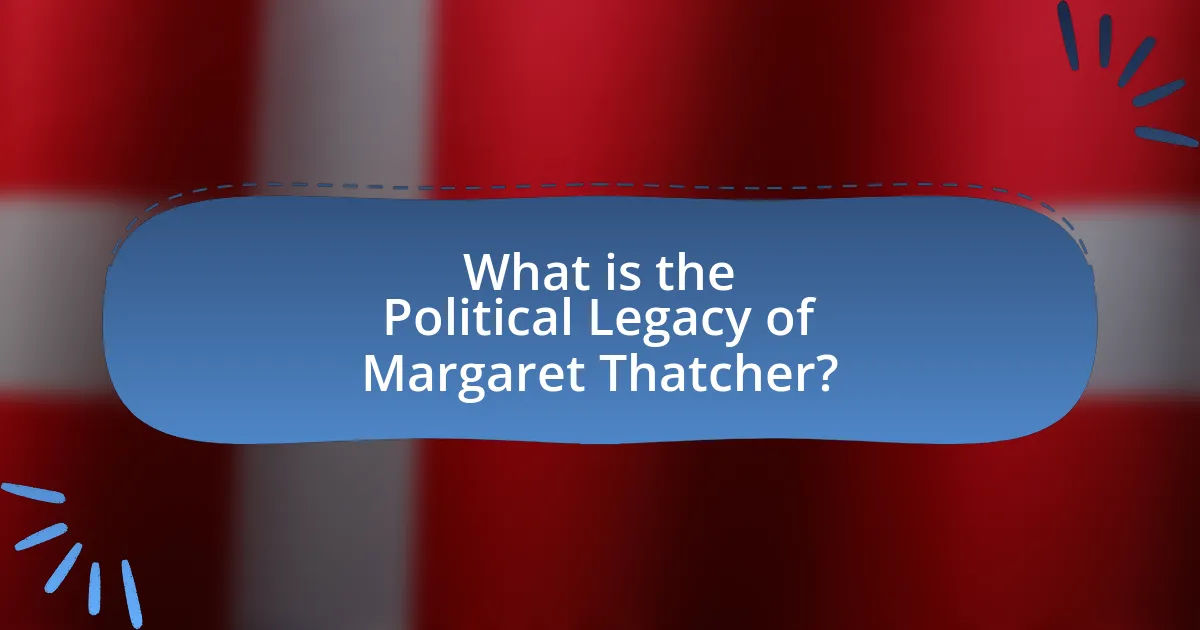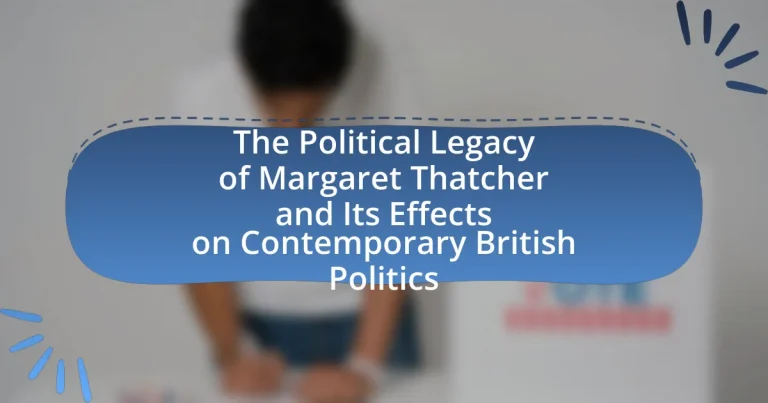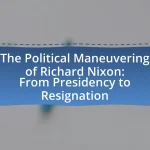The political legacy of Margaret Thatcher is defined by her implementation of neoliberal economic policies during her tenure as Prime Minister from 1979 to 1990. Her administration emphasized deregulation, privatization of state-owned industries, and a reduction in trade union power, fundamentally transforming the British economy and political landscape. The article explores how Thatcher’s policies reshaped British politics, influenced contemporary political discourse, and led to ongoing debates about economic inequality and the role of government. It also examines the challenges she faced, her leadership style, and the lasting effects of her governance on both the Conservative and Labour parties, highlighting the complex perspectives surrounding her legacy.

What is the Political Legacy of Margaret Thatcher?
The political legacy of Margaret Thatcher is characterized by her implementation of neoliberal economic policies, which emphasized deregulation, privatization of state-owned industries, and a reduction in the power of trade unions. Thatcher’s government, from 1979 to 1990, transformed the British economy by promoting free-market principles, leading to significant changes in public sector management and welfare policies. Her policies resulted in a shift towards individualism and entrepreneurship, which have influenced contemporary British politics by fostering a political environment that prioritizes market solutions over state intervention. The long-term effects of her governance include ongoing debates about economic inequality and the role of government in the economy, as evidenced by the continued prominence of her policies in the platforms of modern Conservative Party leaders.
How did Margaret Thatcher’s policies shape British politics?
Margaret Thatcher’s policies fundamentally reshaped British politics by introducing neoliberal economic principles and reducing the role of the state in the economy. Her government implemented significant tax cuts, deregulation, and privatization of state-owned industries, which shifted the political landscape towards free-market ideologies. For instance, the privatization of British Telecom in 1984 and British Gas in 1986 exemplified her commitment to reducing government intervention. These policies not only transformed the economy but also realigned political party ideologies, leading to the Conservative Party’s dominance in the late 20th century and influencing Labour’s shift towards the center under Tony Blair in the 1990s. Thatcher’s legacy continues to impact contemporary British politics, as debates over the role of government and market forces remain central to political discourse.
What were the key policies implemented during Thatcher’s tenure?
The key policies implemented during Thatcher’s tenure included economic liberalization, privatization of state-owned industries, and a reduction in the power of trade unions. Economic liberalization involved reducing government intervention in the economy, which aimed to foster free-market principles. Privatization saw the transfer of public assets, such as British Telecom and British Gas, to private ownership, significantly altering the landscape of British industry. Additionally, the reduction of trade union power was achieved through legislation that limited union activities and strikes, reshaping labor relations in the UK. These policies collectively aimed to stimulate economic growth and reduce inflation, contributing to a significant shift in British political and economic paradigms during the 1980s.
How did these policies impact the British economy?
Margaret Thatcher’s policies significantly transformed the British economy by promoting deregulation, privatization, and reducing the power of trade unions. These measures led to increased economic growth, with the UK experiencing a GDP growth rate of approximately 3.2% annually during her tenure from 1979 to 1990. The privatization of state-owned industries, such as British Telecom and British Gas, generated substantial revenue and increased efficiency, contributing to a shift towards a market-oriented economy. Additionally, the reduction of union power resulted in lower inflation rates, which fell from over 10% in the early 1980s to around 3% by the end of her premiership. Overall, these policies reshaped the economic landscape, fostering a more competitive environment while also leading to increased income inequality and regional disparities.
Why is Margaret Thatcher considered a pivotal figure in British history?
Margaret Thatcher is considered a pivotal figure in British history due to her role as the first female Prime Minister and her implementation of significant economic and social reforms. Serving from 1979 to 1990, she introduced policies that emphasized deregulation, privatization of state-owned industries, and a reduction in the power of trade unions, which transformed the British economy. Her government reduced inflation from over 20% in the early 1980s to around 4% by the end of her tenure, showcasing the impact of her economic strategies. Additionally, Thatcher’s strong stance against the Soviet Union during the Cold War solidified her position as a key player in international politics, earning her the nickname “The Iron Lady.” These actions and their long-lasting effects on both British society and global politics underscore her significance in history.
What were the major challenges she faced while in office?
Margaret Thatcher faced significant challenges during her time in office, including economic recession, high unemployment, and social unrest. The economic recession of the early 1980s led to a peak unemployment rate of 3 million, which fueled public discontent and strikes, notably the miners’ strike of 1984-1985. Additionally, her policies of deregulation and privatization faced opposition from labor unions and segments of the public, leading to widespread protests. These challenges tested her leadership and shaped her political legacy, influencing contemporary British politics by establishing a precedent for neoliberal economic policies.
How did her leadership style influence her political legacy?
Margaret Thatcher’s leadership style, characterized by decisiveness, conviction, and a strong ideological framework, significantly shaped her political legacy by establishing a model of governance that prioritized free-market principles and individualism. Her approach to leadership, often described as uncompromising and assertive, allowed her to implement sweeping economic reforms, such as deregulation and privatization of state-owned industries, which transformed the British economy in the 1980s. The success of these policies is evidenced by the reduction of inflation from over 10% in the early 1980s to around 3% by the end of her tenure, as well as a notable increase in GDP growth. Thatcher’s leadership style also fostered a sense of national pride and resilience, which contributed to her enduring influence on the Conservative Party and contemporary British politics, as her policies continue to resonate with modern political discourse.
What are the lasting effects of Thatcher’s policies on contemporary British politics?
Thatcher’s policies have led to a lasting emphasis on neoliberal economic principles in contemporary British politics. These principles include deregulation, privatization of state-owned enterprises, and a reduction in the power of trade unions, which have shaped the economic landscape and political discourse in the UK. For instance, the privatization of British Telecom and British Gas in the 1980s set a precedent for subsequent governments, influencing their approach to public services and market competition. Additionally, the decline of union power has contributed to a shift in labor relations, impacting workers’ rights and wage negotiations. The ideological framework established during Thatcher’s tenure continues to influence political parties, with both the Conservative Party and elements of the Labour Party adopting market-oriented policies.
How do Thatcher’s economic policies influence current political debates?
Thatcher’s economic policies significantly influence current political debates by shaping discussions around free markets, austerity, and public sector reform. Her emphasis on deregulation and privatization has led to ongoing arguments about the role of government in the economy, with proponents advocating for minimal state intervention and critics highlighting the social inequalities that can arise from such policies. For instance, the legacy of her approach is evident in contemporary debates over austerity measures, which have been implemented in response to economic crises, reflecting her belief in reducing public spending to foster economic growth. Additionally, the privatization of state-owned enterprises during her tenure has set a precedent that continues to inform discussions about the efficiency and effectiveness of public versus private ownership in various sectors.
What aspects of her economic strategy are still relevant today?
Margaret Thatcher’s economic strategy, particularly her emphasis on free-market principles, deregulation, and privatization, remains relevant today. These aspects have shaped contemporary economic policies in the UK and beyond, promoting competition and efficiency in various sectors. For instance, the privatization of state-owned enterprises during her tenure, such as British Telecom and British Gas, has influenced ongoing debates about the role of government in the economy and the benefits of private ownership. Additionally, her focus on reducing the power of trade unions has had a lasting impact on labor relations and employment practices, fostering a more flexible labor market that is still evident in current economic discussions.
How do contemporary politicians reference Thatcher in their campaigns?
Contemporary politicians reference Margaret Thatcher in their campaigns by invoking her economic policies and leadership style to appeal to conservative values. For instance, many politicians highlight her commitment to free-market principles and deregulation as a framework for their own economic agendas, arguing that these policies can lead to growth and prosperity. Additionally, they often use her image and quotes to resonate with voters who admire her strong leadership during challenging times, particularly in the context of national pride and resilience. This approach is evident in campaigns where candidates align themselves with Thatcher’s legacy to strengthen their positions on issues like taxation and public spending, reinforcing the idea that her policies remain relevant in today’s political landscape.
In what ways has Thatcher’s legacy shaped party politics in the UK?
Thatcher’s legacy has significantly shaped party politics in the UK by establishing a framework of neoliberal economic policies and a strong emphasis on individualism within the Conservative Party. Her government, which lasted from 1979 to 1990, implemented policies such as deregulation, privatization of state-owned industries, and a reduction in the power of trade unions, fundamentally altering the political landscape. These policies have led to a long-lasting ideological shift within the Conservative Party, aligning it more closely with free-market principles and reducing its traditional ties to social conservatism.
Moreover, Thatcher’s approach to governance has influenced the Labour Party, prompting a shift towards the center under leaders like Tony Blair, who adopted elements of her economic policies in what became known as “New Labour.” This adaptation illustrates how Thatcher’s legacy has not only defined Conservative politics but has also compelled opposition parties to recalibrate their platforms in response to her enduring influence.
How have the Conservative Party’s values evolved since her leadership?
Since Margaret Thatcher’s leadership, the Conservative Party’s values have shifted towards a more centrist approach, moving away from the strict neoliberal policies she championed. Initially, Thatcher emphasized free-market principles, privatization, and a reduction in the role of the state, which defined the party’s identity during her tenure. However, in the years following her leadership, particularly under leaders like David Cameron and Theresa May, the party adopted a more inclusive stance on social issues and increased government intervention in certain sectors, such as healthcare and education. This evolution reflects a response to changing public sentiment and the need to appeal to a broader electorate, as evidenced by policies like the “Big Society” initiative and a focus on social justice.
What role does Thatcher’s legacy play in Labour Party opposition strategies?
Thatcher’s legacy significantly influences Labour Party opposition strategies by providing a contrasting ideological framework that the party seeks to challenge. The Labour Party often positions itself against Thatcher’s neoliberal policies, which emphasized deregulation, privatization, and reduced state intervention in the economy. This opposition is evident in Labour’s focus on social justice, public ownership, and increased government spending on public services, which directly counters the principles established during Thatcher’s tenure. For instance, Labour’s critique of austerity measures, which are rooted in Thatcherite economic policies, serves to mobilize support among voters who feel the impact of such policies. This strategic opposition not only defines Labour’s identity but also aims to resonate with the electorate’s desire for a more equitable society, highlighting the enduring relevance of Thatcher’s legacy in shaping contemporary political discourse in the UK.
How do different political factions view Margaret Thatcher’s legacy?
Different political factions view Margaret Thatcher’s legacy through contrasting lenses. Conservatives often celebrate her for revitalizing the British economy, reducing inflation, and promoting free-market policies, which they argue laid the groundwork for economic growth in the 1980s. In contrast, Labour Party members and left-leaning factions criticize her for increasing social inequality, dismantling public services, and fostering a culture of individualism that they believe undermined community values. Additionally, nationalist factions may focus on her strong stance against the Soviet Union, viewing her as a key figure in the Cold War, while others may highlight her controversial policies in Northern Ireland. These divergent perspectives illustrate the complex and multifaceted nature of Thatcher’s impact on British politics.
What are the perspectives of supporters of Thatcher’s policies?
Supporters of Thatcher’s policies generally view them as essential for revitalizing the British economy and restoring national pride. They argue that her emphasis on free-market principles, deregulation, and privatization led to significant economic growth during the 1980s, evidenced by a rise in GDP and a decrease in inflation rates. Supporters also highlight her role in reducing the power of trade unions, which they believe contributed to increased productivity and competitiveness in the UK. Additionally, they credit her foreign policy, particularly her strong stance against the Soviet Union, with helping to end the Cold War and enhance Britain’s global standing. These perspectives are often supported by economic data showing job creation and increased foreign investment during her tenure.
How do supporters argue for the effectiveness of her economic reforms?
Supporters argue for the effectiveness of Margaret Thatcher’s economic reforms by highlighting the significant reduction in inflation and unemployment rates during her tenure. Specifically, her policies, including deregulation and tax cuts, contributed to a decrease in inflation from over 10% in the early 1980s to around 4% by the end of her time in office. Additionally, unemployment peaked at 3 million in 1984 but fell to approximately 1.6 million by 1990, showcasing the positive impact of her reforms on job creation. These statistics are often cited as evidence that her approach revitalized the British economy and laid the groundwork for sustained growth in the following decades.
What achievements do supporters highlight in her foreign policy?
Supporters highlight Margaret Thatcher’s achievement of strengthening the United Kingdom’s global standing through her assertive foreign policy. This included her pivotal role in the Falklands War, where decisive military action reclaimed the islands from Argentine occupation, reinforcing British sovereignty. Additionally, her close relationship with U.S. President Ronald Reagan during the Cold War is noted for promoting a unified Western front against the Soviet Union, contributing to the eventual end of the Cold War. These actions are often cited as key factors in restoring national pride and enhancing Britain’s influence on the world stage.
What criticisms do opponents of Thatcher’s legacy present?
Opponents of Thatcher’s legacy criticize her policies for increasing social inequality and undermining public services. They argue that her economic reforms, particularly the emphasis on deregulation and privatization, disproportionately benefited the wealthy while leading to job losses in traditional industries, particularly in the North of England. Critics also highlight the rise in homelessness and poverty during her tenure, with statistics showing that the number of families living in temporary accommodation rose significantly. Additionally, her approach to trade unions is condemned for weakening workers’ rights and diminishing collective bargaining power, which opponents claim has had lasting negative effects on labor relations in the UK.
How do critics argue that her policies harmed social welfare?
Critics argue that Margaret Thatcher’s policies harmed social welfare by prioritizing free-market principles over public services, leading to increased inequality and reduced access to essential services. For instance, her government implemented significant cuts to social programs and welfare benefits, which critics claim disproportionately affected the most vulnerable populations, including the poor and unemployed. Additionally, the privatization of public services, such as healthcare and housing, resulted in diminished quality and accessibility, further exacerbating social disparities. According to a report by the Institute for Fiscal Studies, income inequality in the UK rose sharply during her tenure, highlighting the negative impact of her economic policies on social welfare.
What are the long-term social impacts attributed to her governance?
The long-term social impacts attributed to Margaret Thatcher’s governance include increased individualism, a shift towards market-oriented policies, and significant changes in social class dynamics. Thatcher’s policies promoted deregulation and privatization, leading to a culture that emphasized personal responsibility and self-reliance. This shift contributed to widening income inequality, as wealth became concentrated among the upper classes, while traditional working-class communities faced economic decline. Additionally, her governance fostered a sense of social fragmentation, as community ties weakened in favor of individual pursuits. These impacts are evidenced by the rise in social mobility for some, contrasted with the stagnation of opportunities for others, particularly in post-industrial regions.
What lessons can contemporary politicians learn from Thatcher’s legacy?
Contemporary politicians can learn the importance of strong leadership and clear communication from Thatcher’s legacy. Margaret Thatcher’s tenure demonstrated that decisive action and a well-articulated vision can galvanize public support and drive significant policy changes, as seen in her economic reforms that shifted the UK towards a market-oriented economy. Her ability to communicate complex ideas simply and effectively helped her connect with the electorate, evidenced by her repeated electoral victories. Additionally, Thatcher’s commitment to her principles, even in the face of opposition, illustrates the value of political conviction, which can inspire loyalty and trust among constituents.
How can modern leaders apply Thatcher’s strategies to current issues?
Modern leaders can apply Margaret Thatcher’s strategies to current issues by emphasizing strong economic policies, prioritizing deregulation, and promoting individual responsibility. Thatcher’s approach to reducing government intervention in the economy led to significant growth in the UK during the 1980s, evidenced by a GDP increase of 3.2% in 1984 alone. By adopting similar fiscal conservatism and encouraging entrepreneurship, contemporary leaders can address economic challenges such as inflation and unemployment. Additionally, Thatcher’s focus on national sovereignty and assertive foreign policy can guide leaders in navigating global geopolitical tensions, as seen in her firm stance against the Soviet Union. This combination of economic pragmatism and strong leadership can help modern leaders effectively tackle today’s complex issues.
What pitfalls should contemporary politicians avoid based on her experiences?
Contemporary politicians should avoid the pitfalls of alienating key voter demographics and failing to communicate effectively, as evidenced by Margaret Thatcher’s experiences. Thatcher’s policies, particularly during her tenure as Prime Minister, often marginalized working-class voters and those in the North of England, leading to significant electoral losses for the Conservative Party in subsequent years. Additionally, her communication style, which was sometimes perceived as overly confrontational, alienated potential supporters. These lessons highlight the importance of inclusive policies and effective communication strategies in maintaining broad electoral support.


